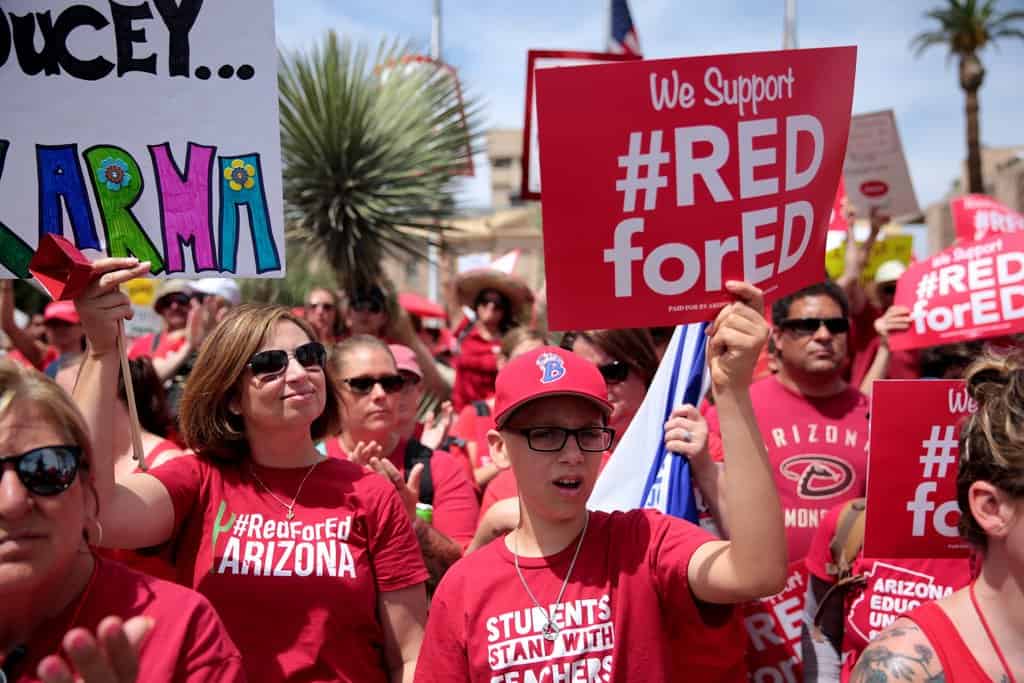
Ryan Gorman is a student at Harvard Law School.
Bloomberg Law reports that teacher strikes across the U.S. have led to higher bargained-for wages over the past two years. In 2018, teachers and other school staff across West Virginia went on strike to protest working conditions in the state’s schools. Similar strikes around the country followed, often assisted by social media and accompanied by the hashtag #RedForEd. Since then, teacher salaries in the first year of collective-bargaining agreements increased by 3.2% on average nationwide, an improvement from 2015-2017’s average increase of 2.27%. States which saw large-scale mass action saw even greater increases. This bump in pay has also tended to come in the form of lasting raises, as opposed to one-time increases in bonuses. As the analysis notes, walkouts appear to have been less successful when it comes to non-wage-related demands, such as increases in general education funding and decreases in class size. The analysis also excluded statewide legislative actions that have come about as result of the teacher strikes. Meanwhile, in North Carolina, organizers are circulating questionnaires to survey teachers’ willingness to miss work to protest working conditions, despite a statewide ban that makes it illegal for public school teachers to strike.
A nationwide franchisee of 99 Wendy’s and Fazoli’s restaurants will have to pay over $150,000 for child labor law violations. Investigators with the Department of Labor’s Wage and Hour Division (WHD) found that Manna Inc., a Louisville-based company, violated child labor requirements by allowing fourteen- and fifteen-year-old employees to work outside of legally approved hours at several of their fast food restaurants. Investigators found violations at stores across the country, in Colorado, Florida, Kansas, Kentucky, Minnesota, Missouri, Nebraska, Tennessee, and Wisconsin. Violations included having minors work before 7 AM and after 7 PM on school nights, as well as requiring minors to work more than three hours on a school day or more than eight hours on non-school days. Such practices violate the Fair Labor Standards Act (FLSA).
Lee Saunders, president of the American Federation of State, County and Municipal Employees, has a piece in The Root highlighting some of Dr. Martin Luther King, Jr.’s thoughts on the American labor movement. As Saunders points out in the piece, Dr. King spoke of the dignity inherent in all labor, and—especially in his later years—emphasized the importance of worker solidarity. One of Dr. King’s final public events was an appearance in 1968 to stand with striking sanitation workers in Memphis. Other publications also ran pieces noting Dr. King’s ties to the labor movement (In These Times boosted an earlier piece on Dr. King’s “forgotten socialist history”).
Indonesia is set to overhaul many of the country’s employment laws. The government plans to introduce a bill that would tweak 79 different existing laws. Many of the reforms are aimed at lowering the cost of foreign investment in the country and purportedly simplifying business licensing processes. Opponents of the bill are concerned that cuts to severance pay could be in the works (Indonesia has one of the most generous severance pay systems in the world). The proposed changes have been met with skepticism from trade unions within the country, many of whom worry that the tweaks will lower worker protections.






Daily News & Commentary
Start your day with our roundup of the latest labor developments. See all
December 11
House forces a vote on the “Protect America’s Workforce Act;” arguments on Trump’s executive order nullifying collective bargaining rights; and Penn State file a petition to form a union.
December 8
Private payrolls fall; NYC Council overrides mayoral veto on pay data; workers sue Starbucks.
December 7
Philadelphia transit workers indicate that a strike is imminent; a federal judge temporarily blocks State Department layoffs; and Virginia lawmakers consider legislation to repeal the state’s “right to work” law.
December 5
Netflix set to acquire Warner Bros., Gen Z men are the most pro-union generation in history, and lawmakers introduce the “No Robot Bosses Act.”
December 4
Unionized journalists win arbitration concerning AI, Starbucks challenges two NLRB rulings in the Fifth Circuit, and Philadelphia transit workers resume contract negotiations.
December 3
The Trump administration seeks to appeal a federal judge’s order that protects the CBAs of employees within the federal workforce; the U.S. Department of Labor launches an initiative to investigate violations of the H-1B visa program; and a union files a petition to form a bargaining unit for employees at the Met.